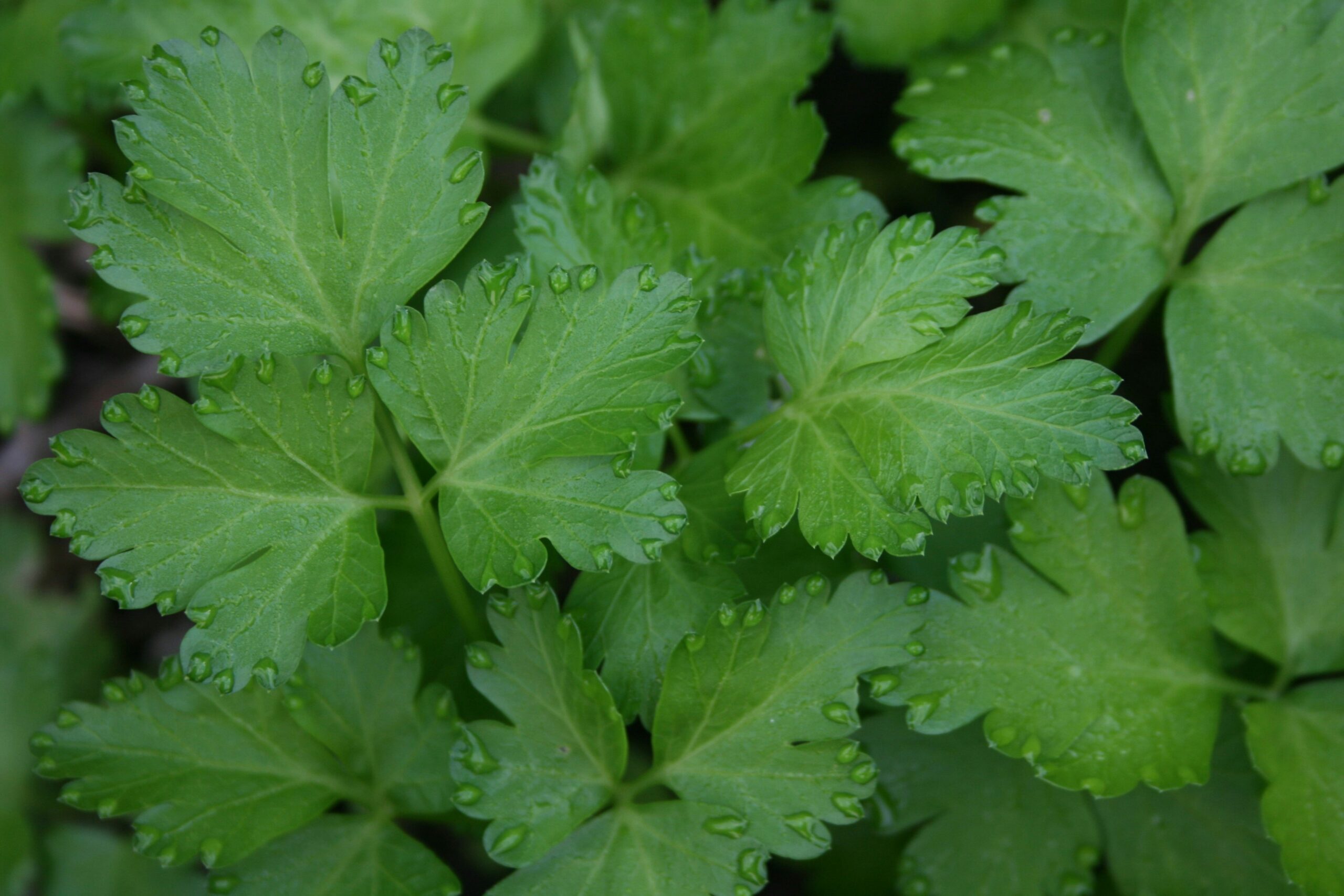Parsley is among the oldest known condiment plants. Parsley is a green, biennial plant with white roots originating from Mediterranean countries, and edible leaves are used for many purposes. It has small, triangular leaves on the end of long stems. While the culinary application of parsley is best known for increasing the flavor in meals, it might shock you that there are many other uses.
Parsley is rich in minerals and vitamins, so its consumption increases a meal's nutritional value. The nutrient content of this green varies depending on the type or species being consumed. It is also a low-calorie herb.
Parsley is also used medically and is considered best for health benefits. The plant can be used for the treatment of different diseases and to safeguard against health risk factors. They are also sometimes included in cosmetics, as they help to make the skin look fresher. Using parsley, however, comes with a set of side effects like any other herb. If you do not want to harm yourself, some contraindications make it worthwhile. Find out more about parsley.

Parsley is utilized broadly as a green vegetable and spice. However, it is frequently developed in the kitchen and used for therapeutic purposes in professional medicine. Parsley has been shown to contain compounds from a wide range of phytochemical categories. This plant is also ascribed to other pharmacological activities. Parsley, too, is very nutritious and full of nutrients. Health benefits of parsley include:
Parsley contains several flavonoids![]() , which give the plant its antioxidant effects. This means that parsley can protect your body's cells from harm caused by free radicals. So, eating a parsley diet can prevent many diseases. On top of this, plant supplementation extract can also improve antioxidant enzyme levels.
, which give the plant its antioxidant effects. This means that parsley can protect your body's cells from harm caused by free radicals. So, eating a parsley diet can prevent many diseases. On top of this, plant supplementation extract can also improve antioxidant enzyme levels.
Parsley leaf extracts reduce blood sugar. Various studies have brought antihyperglycemic activity by those plants to the limelight. Parsley can even reverse the heart damage that occurs due to hyperglycemia. Parsley tends to cause an expansion in insulin obstruction; its flavonoids lessen this indication of diabetes. Parsley is also known to be used in treating diabetes, although this may vary from country to country.

Studies have also shown the analgesic effects of parsley extracts. It is also identified as having an antispasmodic effect. Specifically, when it pertains to rheumatoid joint pain![]() , several of the same residential properties in parsley could be helpful. Beta-carotene in parsley composition flushes out inflammation and relieves severe pain. This is now a top choice for parsley leaves used medicinally in natural medicine to treat wounds. You can alleviate this disease with parsley tea.
, several of the same residential properties in parsley could be helpful. Beta-carotene in parsley composition flushes out inflammation and relieves severe pain. This is now a top choice for parsley leaves used medicinally in natural medicine to treat wounds. You can alleviate this disease with parsley tea.
Parsley seed essential oil was investigated for its effects, and the results indicated that it functioned by suppressing cellular immune response. That means parsley potentiates the therapeutic actions of an immature or defective immune system by boosting its operation and dampens a too-aggressive reaction from that same over-performing immune squad. Parsley impacts many branches of the immune system.
People with intestinal diseases are advised to eat parsley regularly. The plant is beneficial for digestion, anti-worm, and liver complaints. Such cytoprotective properties of the parsley leaf extract play a key role in its successful healing actions on peptic ulcer disease. It also acts as a laxative![]() , which helps in the case of digestive diseases (seed extract). Parsley: — Rich in fiber, it reduces stomach muscle stress and helps alleviate heartburn.
, which helps in the case of digestive diseases (seed extract). Parsley: — Rich in fiber, it reduces stomach muscle stress and helps alleviate heartburn.
Parsley leaves are known to reduce blood pressure and possess anti-platelet aggregation activity. The plant has flavonoid agents that are good for the cardiovascular system. Its combination has components that lessen the bad LDL cholesterol level![]() . Because it has ingredients for many harmful heart diseases, this vegetable reduces the burden on the cardiovascular system.
. Because it has ingredients for many harmful heart diseases, this vegetable reduces the burden on the cardiovascular system.

Parsley against multiple pathogens Some other researchers have described the antimicrobial effect, such as the Staphylococcus![]() strain, which can trigger diverse pathological states and skin diseases. In keeping with other inhibitory effects on fungi that may cause disease, parsley constituents are also found in the herb to have antifungal properties.
strain, which can trigger diverse pathological states and skin diseases. In keeping with other inhibitory effects on fungi that may cause disease, parsley constituents are also found in the herb to have antifungal properties.
Parsley contains ingredients that can provide anticancer effects and control the outgrowth of malignant tumors. Studies have found that parsley affects diseases such as prostate and colorectal cancer. The system works by preventing cancer's growth and survival. It also reduces the metabolism of carcinogens.
Not only is parsley a blood purifier, but it also has effective fertility-boosting properties. Parsley can positively affect hormone levels with its action on the reproductive system, both feminine and masculine. On top of that, parsley is hydrating and diuretic![]() for the kidneys and urinary tract, helping to prevent infections. Parsley also works wonders in combating kidney stones.
for the kidneys and urinary tract, helping to prevent infections. Parsley also works wonders in combating kidney stones.
Parsley is also used in cosmetics and to treat skin diseases. The plant also benefits the skin with its many nutrients. This is not just a property of the strong collagen supply that the leaves consume; it also lowers abnormalities and scars. Parsley: if you have an oily face, this is for you; it controls sebum production, which means fewer zits! Because of this, parsley can be used to treat skin inflammation and hair/scalp problems like dandruff![]() .
.
Because of the many nutrients in parsley, consumption contributes to keeping your bones healthy and strong. Parsley because it maintains the health of our bones and prevents osteoporosis![]() by standing right behind us. The vitamins increase the bioavailability of calcium from the diet, decrease renal calcium excretion, and modify bone matrix proteins to strengthen them. Moreover, parsley works as an adjuvant for arthritis pain and joint disease.
by standing right behind us. The vitamins increase the bioavailability of calcium from the diet, decrease renal calcium excretion, and modify bone matrix proteins to strengthen them. Moreover, parsley works as an adjuvant for arthritis pain and joint disease.

Since parsley is a low-calorie vegetable, it does not affect body weight and can provide nutrients quickly. This plant speeds up the flow of minerals in your body, and it also helps digestion processes and kidney functions. Parsley is ideal for the digestive system and has properties that contribute to losing weight, in addition to reducing fluid retention. Parsley supports several areas of the body, which then affects overall function and helps with weight loss.
Its constituents are potent brain-enhancing properties. It stimulates the neurotransmitters that abnormally affect cognition and may support a memory-powered brain. Parsley makes more brain work. The features in parsley are additionally employed to take care of neurodegenerative conditions such as schizophrenia![]() , Alzheimer's disease
, Alzheimer's disease![]() , and Parkinson's illness
, and Parkinson's illness![]() . According to several studies, green leafy vegetables such as parsley are not just for maintaining a healthy weight; they also slow the brain from aging.
. According to several studies, green leafy vegetables such as parsley are not just for maintaining a healthy weight; they also slow the brain from aging.
The green leaves of parsley contain many active compounds that are a significant potency source. Moreover, parsley is cholesterol and fat-free, so it contains fewer calories. 100g of fresh leaves contains 36 calories![]() . Parsley is rich in nutrients, and its macronutrients are carbohydrates and protein. The health compounds in parsley also need carbohydrates for their synthesis. The plant also contains significant amounts of dietary fiber
. Parsley is rich in nutrients, and its macronutrients are carbohydrates and protein. The health compounds in parsley also need carbohydrates for their synthesis. The plant also contains significant amounts of dietary fiber![]() . Meanwhile, below is the list of micronutrients and active compounds that are found in parsley;
. Meanwhile, below is the list of micronutrients and active compounds that are found in parsley;

Parsley leaves contain more flavonoids. This variety provides essential chemical compounds that are remarkably similar to parsley-based extracts. Parsley contains polyphenolic flavonoid antioxidants, which are antioxidants of a plant origin. One important flavonoid, quercetin, helps in both anti-inflammatory and antioxidant; apart from that, another very useful is luteolin![]() , which has high antioxidant activities. Two of its most important roles involve protecting the brain and nervous system. More recently, it has been found that the leaves contain quercetin
, which has high antioxidant activities. Two of its most important roles involve protecting the brain and nervous system. More recently, it has been found that the leaves contain quercetin![]() – another tool for strengthening human defenses against infections and diseases of civilization and maintaining a healthy body.
– another tool for strengthening human defenses against infections and diseases of civilization and maintaining a healthy body.
Also, value sharing some of the health properties are due to parsley essential oils from either seeds or leaves. Parsley contains the organic compound limonene![]() , which helps fight harmful pathogens and is only found in a handful of superfoods. Furthermore, this oil helps in maintaining healthy skin. Moreover, parsley is rich in eugenol
, which helps fight harmful pathogens and is only found in a handful of superfoods. Furthermore, this oil helps in maintaining healthy skin. Moreover, parsley is rich in eugenol![]() , which has been used medicinally as an anesthetic and antiseptic agent for teeth dentistry. Separate studies suggest that eugenol may also help lower sugar levels in people with diabetes, though more research on the topic is warranted.
, which has been used medicinally as an anesthetic and antiseptic agent for teeth dentistry. Separate studies suggest that eugenol may also help lower sugar levels in people with diabetes, though more research on the topic is warranted.
Coumarins are a substance found in parsley that has multidirectional action. Coumarin derivatives are broad-spectrum agents. Coumarins possess analgesic, anti-edematous, sedative, diastole, and antiallergic actions with free radical scavenging effects. The isolated furocoumarins from parsley leaf extract strongly oppose various pathogens. Coumarins are found in many areas, and because of their effective properties, they have been involved in different sciences, such as the food industry, pharmaceuticals, and cosmetics.
Parsley is loaded with minerals. The plant can produce an extensive volume of potassium![]() , a vital element found in cell fluids that can significantly influence heart rate and blood pressure levels. Parsley is also very rich in iron
, a vital element found in cell fluids that can significantly influence heart rate and blood pressure levels. Parsley is also very rich in iron![]() . These components contribute to iron absorption, so parsley is used to treat anemia. It further contains manganese, calcium, and magnesium. Parsley is rich in abundant quantities of diverse minerals, which can benefit people with a balanced diet.
. These components contribute to iron absorption, so parsley is used to treat anemia. It further contains manganese, calcium, and magnesium. Parsley is rich in abundant quantities of diverse minerals, which can benefit people with a balanced diet.
Parsley: It is rich in many vitamins. Most importantly, plants with very high levels of vitamin C have many beneficial effects on our health. It also has vitamin E and B vitamins. The plant also consists of additional compounds impacting the production of vitamins, such as beta-carotene![]() . This is a member of the carotenoid group and is from vitamin A synthesis in the body. It is so rich in this that lifting parsley relieves various vision diseases. The herb is also an ideal supply of Vitamin K
. This is a member of the carotenoid group and is from vitamin A synthesis in the body. It is so rich in this that lifting parsley relieves various vision diseases. The herb is also an ideal supply of Vitamin K![]() that supports bone and joint health.
that supports bone and joint health.

Parsley is delicious in food, and there are many good things about parsley, so it is a pity if you do not. But you need to know how to take parsley: the benefits and harm from improper plant use will help avoid any complications from prolonged uncontrolled administration. We comply with the guidelines or read usage warnings when using parsley-based products. Parsley is safe for most healthy people to eat in minor or moderate amounts. Still, there are exceptions when it is not advised to eat parsley or too much of this herb.

Parsley allergies may occur. That would be the localized allergic response. Some of the constituents in parsley are irritants and may lead to symptoms of skin irritation. While parsley is not one of the common allergens, it can cause an allergic response in a few cases when exposed to a plant. For this reason, use caution and talk to a physician if allergies occur.
The substances of parsley affect a woman's body since they work directly on the uterus and menstruation. Parsley contains a compound that can serve as an abortifacient; thus, pregnant persons are advised not to consume large amounts of the herb. Parsley oil, if taken in large amounts, can also lead to uterine contractions and, ultimately, miscarriage![]() .
.
Additionally, avoid parsley supplements if you are pregnant. Fresh herbs are considered safe, in moderate amounts, when used as a food additive or flavoring; however, there is no established guideline for using these products during pregnancy, which might depend on the health care provider prescribing them.
Parsley is an excellent way for everyone to cleanse, but breastfeeding women should be careful not to consume vast quantities since the herb may decrease milk production.
More amounts of parsley are not recommended in individuals with kidney illness and hyperkalemia (excessive blood potassium). Green leaves contain high levels of oxalic acid, which may increase the likelihood of kidney stones. Swallowing parsley oil may harm the kidneys, and those with kidney problems should not use it.
Parsley is rich in many compounds that can alter the effects of some medications. This vitamin K can interfere with the effectiveness of blood-thinning![]() drugs, so those receiving treatment are better off avoiding parsley. Vitamin K works by increasing coagulation function, which can reduce the medication's properties.
drugs, so those receiving treatment are better off avoiding parsley. Vitamin K works by increasing coagulation function, which can reduce the medication's properties.
On the surface, it looks like almost every other herb but in bundles. For this reason, some observers have confused parsley with other deadly plants. Parsley, frequently mistaken for hemlock![]() , is a poisonous species that could result in death upon ingestion. This is why you need to eat parsley from excellent and trusted sources.
, is a poisonous species that could result in death upon ingestion. This is why you need to eat parsley from excellent and trusted sources.